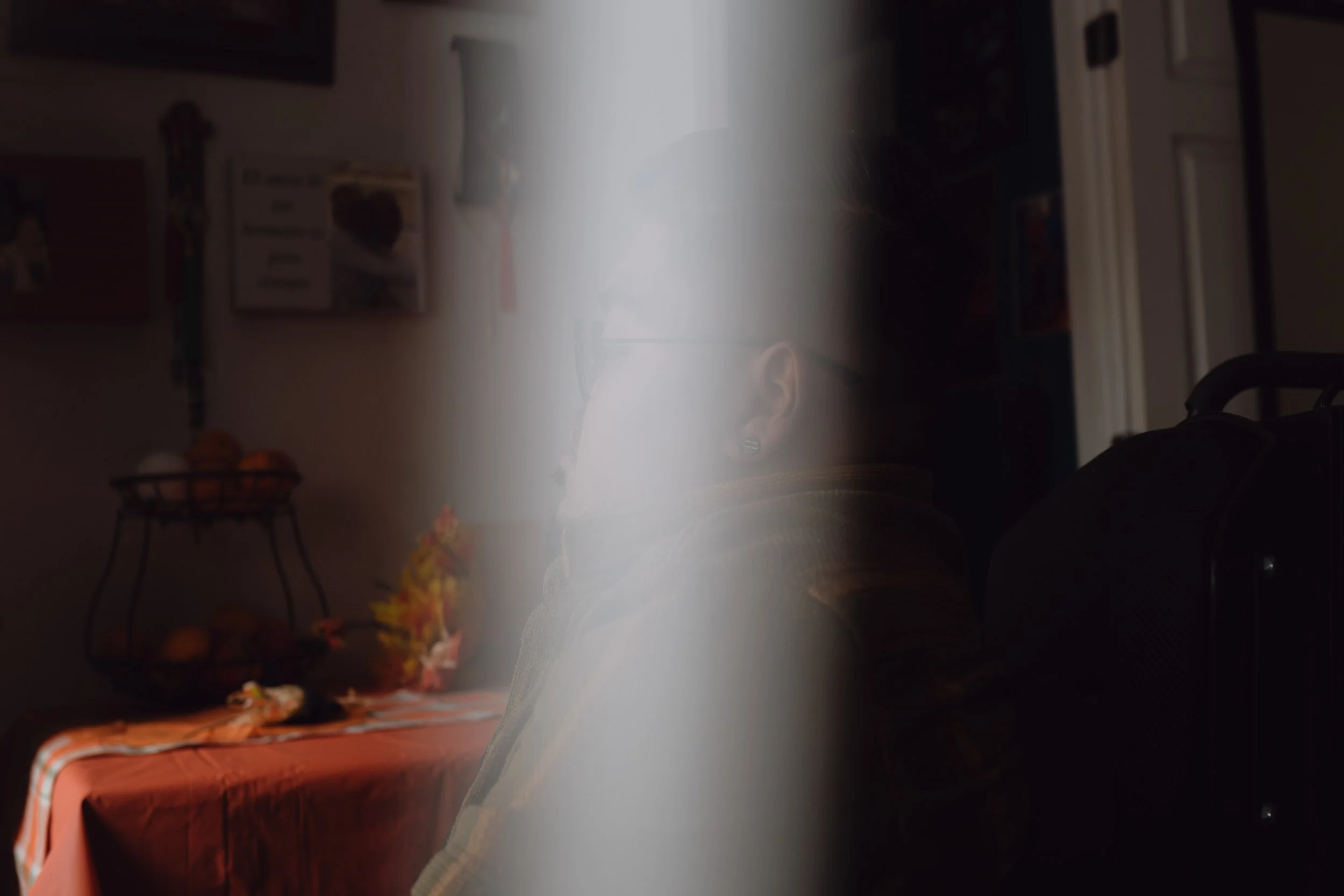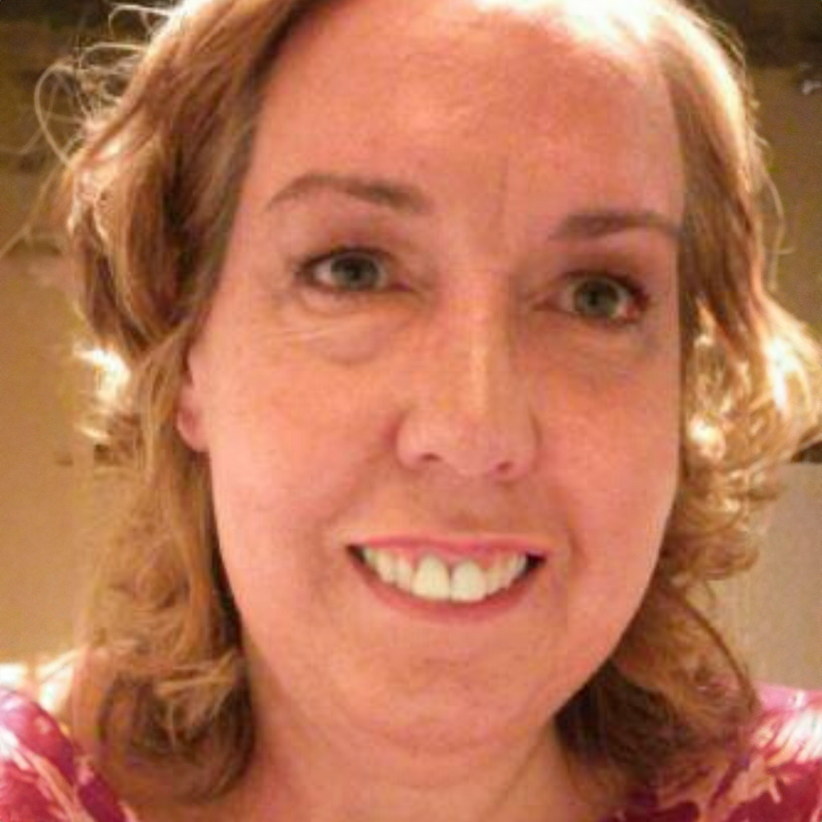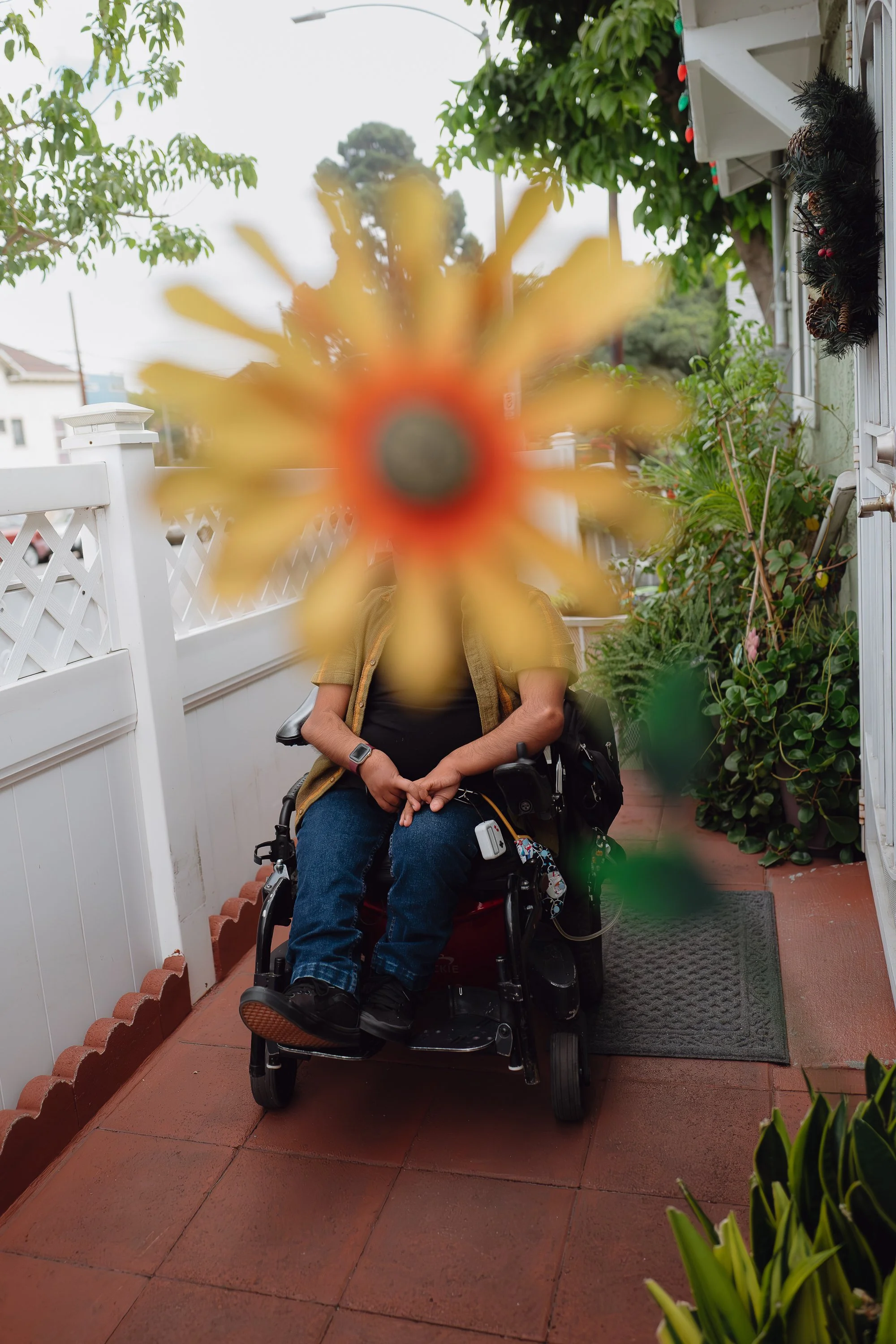Nicolás’ Mission Interrupted: How Political Warfare Shuttered the Program That Saved His Life
Nicolás, a former health educator at Children’s Hospital Los Angeles, learned about the closure of the hospital’s transgender youth development program on the same day it was announced. The news was devastating to him as a trans man who has relied on those services throughout his life. Photo by Zaydee Sanchez for palabra
When federal threats met institutional silence, 3,000 trans patients at Children's Hospital Los Angeles lost the care that kept them alive. Twenty miles away, another hospital made a different choice.
In July 2025, Children's Hospital Los Angeles (CHLA) closed its Center for Transyouth Health and Development, abandoning approximately 3,000 patients. Nicolás (not his real name), a health educator at the center, learned about the closure the same day as the public, weeks before his third work anniversary. “When they came out into the media and said that we're going to pause on gender-affirming care, they had said that they had talked to us and that it had been a meaningful decision,” he recalls. “But it wasn't. None of us were informed ... We were surprised just like everybody else.”
CHLA did not respond to multiple requests for comments.
The program that saved his life vanished overnight. This is the story of how federal pressure, institutional fear, and funding dependency dismantled one of the nation's premier transgender healthcare programs and left thousands of vulnerable patients with nowhere to turn. And how another institution, facing identical threats, chose instead to fight back.
Nicolás had been coming to CHLA since infancy. Born with Larsen syndrome, a rare genetic disorder affecting bone development that occurs in only one in 100,000 people, he underwent 13 surgeries by age 19. He once overheard a surgery scheduler talking to his parents about a transgender patient. “I was told that I had to use these specific pronouns from the kid because this kid told their parents that they were trans, and they're making me use these pronouns, and how crazy is it?”
Nicolás sat frozen. He was weeks from coming out as transgender himself. That day, he canceled a desperately needed spinal surgery, lying to his mother about being too busy with school. “I didn't feel safe to go back,” he says. “I still need that surgery today.”
Years later, he returned to CHLA as a health educator at the Center for Transyouth Health and Development. One young woman he recruited to the Angels of Change Leadership Program performed an original spoken-word poem at the program's ceremony. “Just seeing her so differently since when I had met her, that was when it hit me. Like, OK, this is actually something that really matters,” he tells palabra. She now has stable housing and employment.
Nicolás received care for Larsen syndrome in his youth. After hearing staff make insensitive comments about transgender patients, he gave up on his health care. Years later, he returned to CHLA as a health educator to ensure other patients would not have a similar experience. Photo by Zaydee Sanchez for palabra
Twenty miles south, at St. John's Community Health in South Los Angeles, a partnership with CHLA ensured continuity: When trans patients aged out of pediatric care at nineteen, they were referred to St. John's.
That rhythm was about to shatter. On January 28, 2025, President Trump signed Executive Order 14187, “Protecting Children from Chemical and Surgical Mutilation,” directing the government to “end transgender care for people under age 19” through threats to Medicare and Medicaid funding.
“What medical provider can exist in California without relying on Medi-Cal? Almost none,” explains a policy analyst who works on LGBTQ Caucus issues and who asked to remain unnamed due to safety concerns. The executive order created a worst-case scenario: “If you provide any of this care, you don't get any money.”
At CHLA and St. John's, facing identical federal pressure, two CEOs were about to make very different decisions.
In January 2025, Nicolás attended a meeting where CHLA CEO Paul Viviano addressed staff concerns. “If Trump wants to do that, then we have to follow what the administration says,” Nicolás recalls Viviano saying. “The only thing that he was able to guarantee was more security.”
On January 31, 2025, the U.S. Department of Health and Human Services terminated St. John's Community Health's $1.6 million CDC grant for transgender services. Jim Mangia, President and CEO of St. John's Community Health, consulted attorneys and got no response from the Centers for Disease Control. But his message to staff was different. “We made a decision internally that we were not going to stop services,” Mangia says. “Regardless of what cuts happen in the grants.”
St. John's backfilled the funding and filed an appeal. In February, the grant was reinstated. In April, it was terminated again. They appealed again. Through two terminations and two appeals, St. John's never stopped serving patients. “We didn't lay off a single worker, we didn't turn away a single patient, and we spent the money on the lawsuits,” Mangia says. They sued the Trump administration multiple times in partnership with California's attorney general. “And we won.”
The legal strategy worked because “Congress has already allocated this money, it was signed by the president, not this one, but the one before,” Mangia explains. “They don't have a big legal standing to just eliminate the grants.”
Jim Mangia, president and CEO of St. John's Community Health, has made the organization a stronghold for gender-affirming health services in Los Angeles. Photo by Zaydee Sanchez for palabra
CHLA's stance had been building for years. “If you look at the CHLA’s page online, on Instagram, on the website, you see disabled kids on there, right?” Nicolás observes. “But there's no mention of any queer services, there's no representation of any queer kids, of any trans kids.” Former employees say the hospital funded LGBTQ+ events but prohibited using the CHLA brand. At St. John's, the approach was fundamentally different. “All of the staff and the leadership of that program are trans,” Mangia says. “They are part of our leadership team.”
“Organizations that first started providing this care have all of a sudden folded to the pressures of the threats to their funding,” says Ariela Cuellar, who leads statewide campaigns at the California LGBTQ Health and Human Services Network. “Gender-affirming care is protected here in California; it is protected by state law. These hospitals are supposed to be following California law.”
As rumors spread that CHLA would close, St. John's started getting calls from panicked parents. “We did receive a lot of calls from parents at Children's Hospital Los Angeles,” Mangia recalls. They purchased supplemental malpractice insurance and trained providers on adolescent transgender care. “We were ready. And when it happened, we pulled the trigger, and we moved.”
In early 2025, St. John's held its quarterly all-staff meeting at the Los Angeles Convention Center; the organization's 1,400 employees couldn't fit in their own building. Mangia laid out the plan: Expand transgender health services, sue the Trump administration, continue serving undocumented immigrants, TGI patients, and develop “Healthcare Without Fear” to send doctors to patients' homes.
“One staff member after another staff member after another, after another, after another, after another stood up,” Mangia recalls, “And said they were proud to work at St. John's, that they were down for the fight, and that they supported whatever we needed to do to fight.”
“That's when I knew that I had the support I needed to lead a fight back.”
The staff at St. John’s Community Health in Los Angeles is fighting to continue offering gender-affirming health care to its patients. Photo by Zaydee Sanchez for palabra
In July, Nicolás learned about the closure through media reports. He was fired weeks before his third work anniversary. “I had one of my colleagues express to me how they had to go back to doing sex work or how they were scared because they were going to be homeless again.”
Three thousand patients suddenly had nowhere to go. “If you were at CHLA with your youth, they close their clinic, and you go, okay, I need to find another one, and they say, hey, you know, maybe try out Kaiser, right?” the policy analyst recounts. “So a parent goes, okay, I'll do Kaiser. They go to Kaiser, and then what happens? Kaiser just announced they're not doing gender-affirming care.”
St. John's absorbed as many as they could. Dr. Johanna Olson-Kennedy, who had run CHLA's program, opened her own private practice. Between St. John's expansion and Dr. Olson-Kennedy's clinic, Mangia estimates that the vast majority found continuity of care. But that safety net only existed because St. John's had defied the same pressure that made CHLA fold. Dr. Olson-Kennedy did not respond to requests for comments.
The targeting of transgender healthcare occurs against a backdrop of escalating violence. FBI data shows an 8.6% increase in sexual-orientation and gender-identity bias crimes, reaching 2,936 incidents in 2023. Research indicates that 52% of anti-LGBTQ+ incidents target transgender people, documenting 84 injuries and 10 deaths.
Jim Mangia doesn't mince words about CHLA's decision. “I was extremely disappointed with CHLA's decision to close that program. That was unethical. And it was medically unethical, because they had hundreds and hundreds of patients in treatment. With no warning. That was medical malpractice, number one. It was completely immoral. And it was socially irresponsible. Because they were under no direct threat at that moment.”
CHLA closed before any funding was actually withdrawn. “There was no move yet to pull funding from Children's Hospital,” Mangia says. “To acquiesce in advance is basically to give him (Trump) the ammunition he needs to win. Most of the stuff that Trump is doing is abjectly and completely unconstitutionally illegal. But he gets away with it because people give in without putting up a fight.”
Protesters demonstrate against the planned closure of the trans youth clinic at Children's Hospital Los Angeles, Thursday, July 3, 2025, in Los Angeles. Photo by Jae C. Hong/AP Photo
Mangia acknowledges the fear. “I was scared,” he admits. Expanding trans youth services might “put a target on our back.” But then he asks, “What was the alternative? For us, turn those folks away. Tell them, oh, sorry, we're scared, so we can't provide your healthcare. That was not an option.”
Other clinic directors have started to reach the same conclusion. “Many of my colleagues in the clinic world were saying things to me like, well, you know, I just figured I'd keep my head down, and not say anything, and remain quiet, but, you know, I didn't get my grant back,” Mangia recounts. “And you did. So maybe I need to fight.”
Three months before CHLA's closure, Senate Bill 418, which would have codified non-discrimination protections in healthcare settings, passed the California legislature with bipartisan support. But Governor Gavin Newsom vetoed it on October 13th, 2025.
“The veto definitely sends alarms to advocates,” Cuellar says. “SB418 was one of the most tangible protections that we could have had.” Newsom allocated $15 million “to offset costs for insurers due to the federal change in essential health benefits,” says the policy analyst, ensuring there would be no rise in premiums and that insurers wouldn't deny gender-affirming care. Yet in May 2025, Newsom's administration terminated $17 million in funding for the LGBTQ Health Equity Fund six months early due to a state budget deficit, a contradiction that highlights the gap between rhetoric and resource allocation.
“Our own governor, who's supposedly a big enemy of Trump, is actually doing the same thing when it comes to policy that Trump is doing,” Mangia says bluntly. Added Cuellar, “We can't wait for another whole legislative cycle. “This care is already getting stripped away.” The network is exploring enforcement mechanisms that don't require new legislation.
‘Although the systems continue to fail us, I want to remind folks that that is why we are here, to help hold these systems accountable.’
Cuellar emphasizes the need for broader support: “We really need TGI (Transgender, Gender Diverse, Intersex) allies to step up and be able to advocate and really put themselves on the line for trans folks who may not always feel safe to be as visible.” After years of setbacks, what keeps her grounded? “My community, and thinking of the youth and ensuring that I'm helping build a better world,” she says. “Although the systems continue to fail us, I want to remind folks that that is why we are here, to help hold these systems accountable.”
St. John's is building permanent infrastructure. “Our plan is to develop a Los Angeles County ballot measure,” Mangia explains. The proposal would increase local taxes to backfill county cuts, replace eliminated federal grants, and create an insurance-like product for immigrant families losing Medi-Cal. “In LA County, we're going to create a firewall which is going to ensure that programs like transgender health, immigrant health, Black maternal health, HIV care, LGBT health, all will have funding through this ballot measure.”
Support the voices of independent journalists.
|
St. John's also formalized community support: Friday night dinners, Tuesday lunch-and-learns, and Thursday support groups. They established a Transgender Right to Health Committee providing regular feedback. “It's my job to marshal the resources of the organization,” Mangia says. “But it's also our job to lift those voices and make sure that people are hearing those voices, not my voice.”
In the absence of larger institutional support, community networks have emerged to fill the gap. Ace Anaya, campaign coordinator at Gender Justice LA says they provide harm reduction supplies, emergency preparedness and free wellness services, like reiki, Somatics, massage, and acupuncture by and for TGI folks, andpartners with organizations like Asian Pacific AIDS Intervention Team (APAIT), a community organization in LA that provides HIV services, mental health support, substance use treatment, and housing help for LGBTQ+ people, Asian & Pacific Islander communities, and others who face barriers to care, to provide free HIV/STI testing, and wellness services for affected TGI community members. Older trans community members share what they call “transcestor” wisdom, knowledge passed down about accessing care “through underground methods” when official channels close. “Trans people have always been here and we're going to continue being here,” Anaya says. “The power of the people is so much stronger than the power of those few trying to oppress us.”
Nicolás holds a painting he created during a difficult time in his life. “I wanted to purposely paint with the colors representing the trans community,” he says. The work has become a symbol of his resilience. Photo by Zaydee Sanchez for palabra
Nicolás is in graduate school now, pursuing his clinical social work license. “I think resistance for me is joy and love. Being a trans person in this political climate is so exhausting and so scary ... but finding joy in a time of oppression, like, that's one of the greatest things that you can do.”
“You have to have a moral center,” Mangia says. “And if you believe in social justice, and you believe in health justice, then it's immoral to abandon that mission. I think the moral clarity is that you have to remain true to your mission, and you can't buckle under oppression. As an institution, we have resources. And we have staff. And we can fight back. And I think that's what everyone has to do, because if we all fight back, we win.”
—
Jimena Sandoval is a social communicator who studied at the Universidad Centroamericana José Simeón Cañas (UCA) in El Salvador. She is an entrepreneur and communicator known for her leadership in promoting equity and visibility for the 2SLGBTQIA+ community. As the founder of Noisy Digital, the first trans-led marketing agency, Jimena focuses on empowering marginalized communities, particularly the TGI population. She has been involved in significant initiatives alongside organizations like The TransLatin@ Coalition and Bienestar Human Services. With a strong background in PR and marketing, Jimena works to amplify the voices and stories of the LGBTQIA+ community, creating impactful change and opportunities. @jimenasv387
Zaydee Sanchez is a Mexican American visual storyteller, documentary photographer, and writer from Tulare, California, in the San Joaquin Valley. She seeks to highlight underreported communities and overlooked narratives, with a focus on labor, gender, and displacement. Zaydee is an International Women's Media Foundation grantee and a 2021 USC Annenberg Center for Health Journalism Fellow. Her work has been published in Al Jazeera, National Geographic, and NPR, among others. She lives in Los Angeles. @zaydee.s
Patricia Guadalupe, raised in Puerto Rico, is a bilingual multimedia journalist based in Washington, D.C., and is the co-managing editor of palabra. She has been covering the capital for both English- and Spanish-language media outlets since the mid-1990s and previously worked as a reporter in New York City. She’s been an editor at Hispanic Link News Service, a reporter at WTOP Radio (CBS Washington affiliate), a contributing reporter for CBS Radio network, and has written for NBC News.com and Latino Magazine, among others. She is a graduate of Michigan State University and has a Master’s degree from the Graduate School of Political Management at George Washington University. She is the former president of the Washington, D.C., chapter of NAHJ and is an adjunct professor at American University in the nation’s capital and the Washington semester program of Florida International University. @PatriciagDC












